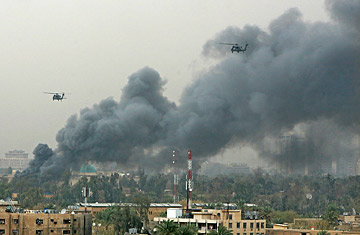
Smoke rises after a mortar attack on March 27, 2008 at the Green Zone area in Baghdad, Iraq.
Against the dull thud-boom of rocket hits and ascending plumes of black smoke, Baghdad's fortified Green Zone rumbled with running soldiers and intermittent cries of "duck and take cover!" The area, where the U.S. embassy compound is located, is taking the worst bombardment in almost nine months. The American-backed Arabic news network al-Hura reported 18 rocket hits in and around the Green Zone on Thursday alone. Since Sunday, dozens have rained down on the compound, which houses both government and diplomatic offices.
U.S. Embassy Public Affairs officer Phil Reeker said five government employees have been seriously injured so far; one American civilian died of his injuries on Wednesday. Another embassy employee reportedly died on Thursday. A city-wide curfew has now been reimposed on Baghdad.
Thursday also marked the third day of escalated fighting in other sections of the city, spurred by the launch of an Iraqi military operation against armed militants — many of them supporters of powerful Shi'ite cleric Moqtada al-Sadr — in the southern Iraqi city of Basra. Thousands of Iraqi Shi'ites massed in three districts of Baghdad, including Sadr City — the notoriously dangerous slum and stronghold of Sadr's militia, the Mahdi Army — to protest the offensive in Basra. One group of demonstrators in Khadamiya district carried a coffin with a photo of Prime Minister Nouri al-Maliki's face and an American flag pasted to the side, as they called for the downfall of Maliki's government.
Maliki's office confirmed that the Iraqi government has given residents of Basra until April 8 to turn over "heavy and medium-size weapons" in return for a reward. Government adviser Sadiq al-Rikabi said the deadline is separate from a three-day ultimatum for gunmen in the southern town to surrender their arms and renounce violence or face harsher measures. That expires later Friday.
The crackling gunfire of AK-47s could be heard near the eastern edge of the Green Zone Thursday morning, and rockets landed in the neighborhoods of Salhiyya, Karada, and al-Allawi. An Iraqi police source told TIME that a car bomb had also been detonated outside a hospital in Andalus Square in central Baghdad. In the district of Khadamiya, a joint American and Iraqi force fought a gun battle Thursday afternoon against armed militants. And local media reported that unidentified gunmen had kidnapped government civilian spokesman for security, Tahsin al-Sheikli, from his home in the al-Amin district of Baghdad, setting the building on fire as they left.
News from the south of Iraq was no less grim. In Basra, Iraqi forces pressed their three-day offensive against what both Iraqi and Coalition forces continue to call "criminal elements." Spokesmen for Moqtada al-Sadr have openly denounced the military campaign and called for the immediate withdrawal of Iraqi forces. In what is widely regarded as an effort to maintain the precarious ceasefire renewed by Sadr in February, both coalition forces and the Iraqi military have carefully avoided referring to the armed fighters as Sadr's supporters, but rather as unaffiliated criminals and thugs. "The operation in Basra, it's not against a particular political trend," Iraqi military spokesman Major General Aziz Mohammed told reporters at a press conference on Thursday. "Those who open fire are not Jaish al-Mahdi [Sadr's Mahdi Army]... I don't think that any member of a political group could open fire on Iraqi forces because they are coming to protect them."
Indeed, though the rockets that hit the Green Zone are believed to have emanated from the Mahdi Army Sadr City stronghold, the U.S. embassy would not say where they were originating from "for security reasons." It is not known whether the U.S. military was moving against the perpetrators of the attack. It is known, however, that Iraqi police have clashed with Sadrists in Sadr City.
Meanwhile, Maliki traveled to Basra on Monday in a show of force against the "criminals." He has given the armed fighters 72 hours to surrender their weapons, a deadline that runs out this weekend. In the Green Zone in Baghdad, Senior British Military Representative Lieutenant Colonel Michael Shearer told TIME that the Iraqi operation is aimed at quelling criminal activity, and that the city has never been under the "control" of militant groups.
But wire reports and eyewitnesses have reflected a far more ferocious battle. Reports indicate that more than 100 people have been killed, and hundreds more wounded since the start of the attack on Tuesday. And independent Iraqi news network al-Sharqia aired footage from Basra of masked, armed men standing atop what it said was the burned carcasses of Iraqi military humvees, with "Jaish al-imam"--Army of the Imam--graffitied on the sides.
Wire sources also reported that a suicide bomber attacked the convoy of Basra police commander Abdul Jalil Khalaf. Khalaf was unharmed but three other police were killed. Sadr supporters also clashed with Iraqi police in the southern towns of Hilla and Kut. With a curfew now in place across southern Iraq and in Baghdad, few in the Iraqi capital see a drop in the renewed violence coming anytime soon.
